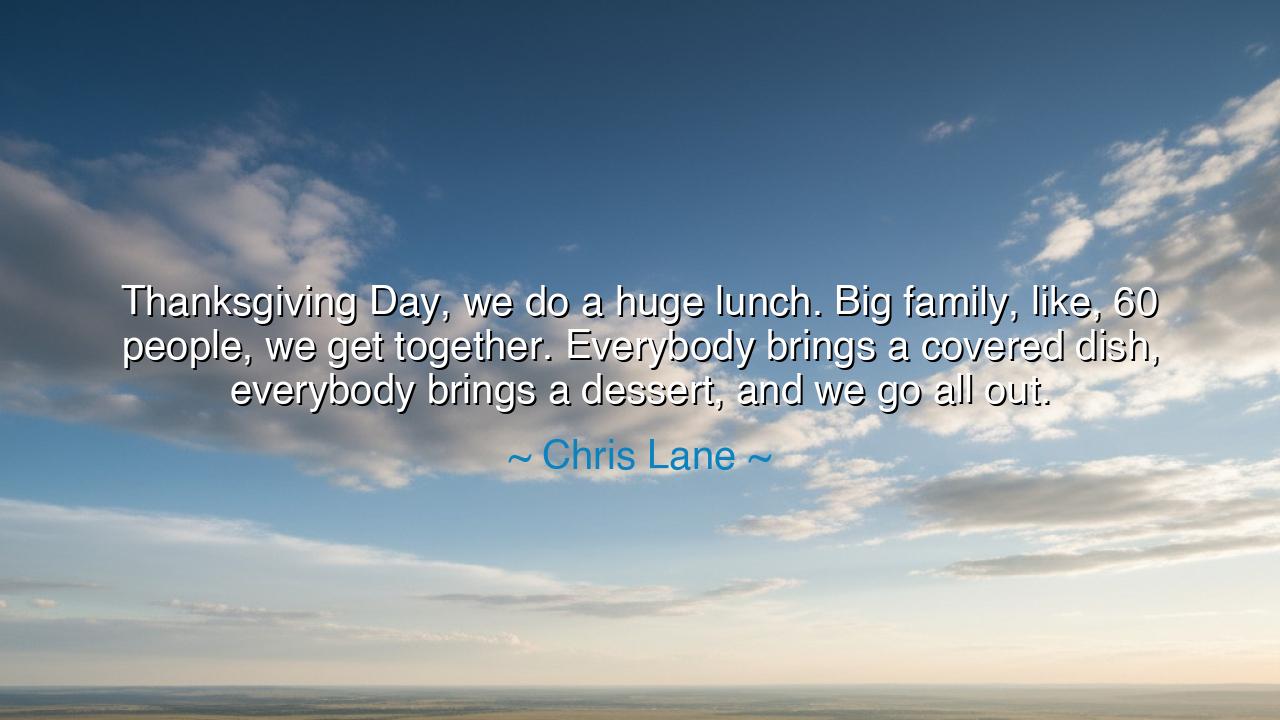
Thanksgiving Day, we do a huge lunch. Big family, like, 60
Thanksgiving Day, we do a huge lunch. Big family, like, 60 people, we get together. Everybody brings a covered dish, everybody brings a dessert, and we go all out.






Chris Lane, with warmth and reverence for his roots, once said: “Thanksgiving Day, we do a huge lunch. Big family, like, 60 people, we get together. Everybody brings a covered dish, everybody brings a dessert, and we go all out.” At first glance, it is a simple recollection of a holiday gathering. Yet beneath these words lies a profound truth about community, generosity, and the sacred act of sharing. For in this vision of sixty souls gathered together, each contributing a piece of the feast, we see the very essence of fellowship: no one carries the burden alone, and all are nourished by one another’s gifts.
The origin of this saying lies in Lane’s own life as a country musician raised in North Carolina, where family bonds and community traditions run deep. His description of Thanksgiving lunch is not about extravagance in wealth, but about abundance born of togetherness. Each covered dish is a token of love, prepared in kitchens scattered across households, then united in one place to form a banquet greater than the sum of its parts. This is not merely food; it is memory, heritage, and identity served upon the table.
History itself echoes with such gatherings. In the early days of the American republic, harvest festivals brought entire towns together, each family contributing to the communal table. The original Thanksgiving of 1621, when Pilgrims and Wampanoag shared the fruits of their labor, was not the feast of one household, but the joining of many. Across cultures, too, we see the same pattern: the potlatch of Indigenous peoples in the Pacific Northwest, where wealth was displayed by giving, not keeping; or the medieval feast days in Europe, when peasants and nobles alike contributed food for festivals that fed entire villages. Lane’s story is but a modern echo of an ancient rhythm: the feast as a mirror of community.
The mention of “60 people” is not incidental—it is heroic. To gather such a multitude in one place is to weave a tapestry of generations, cousins and grandparents, uncles and aunts, the young and the old. Each dish carried to the table is more than flavor; it is a piece of family history. The pie may carry a grandmother’s recipe, the casserole a father’s memory of leaner times, the bread a symbol of a mother’s daily labor. In such a gathering, food is transformed into story, and the table becomes the altar of remembrance.
Notice also the phrase, “we go all out.” This is the cry of joy unrestrained, the recognition that on days of gratitude, restraint has no place. To go all out is not wasteful when it is done in love; it is the outward expression of inner abundance. In this act, the family declares: “We are alive, we are together, we are blessed.” Such lavishness is not measured in riches, but in the overflowing of the human spirit, which delights not in hoarding but in giving freely.
From Lane’s memory, we learn a timeless lesson: true abundance is communal, not individual. The richest feast is not the one a single person prepares alone, but the one to which all contribute, and in which all partake. When burdens are shared, they are lightened; when joys are shared, they are multiplied. This truth applies not only to the holiday table, but to all of life. Work, sorrow, triumph, and laughter—each becomes greater and more bearable when carried together.
So, O listener, let this wisdom guide you. When the day of Thanksgiving or any feast arrives, do not sit idle, waiting to be served. Bring your dish, your song, your story, your labor of love. And when the table is full, remember that it is not the turkey or the pies that make the day holy, but the gathering itself. In a world that often isolates and divides, let us instead “go all out” in community, building tables that stretch long enough to hold everyone, with plates filled not only with food but with love. For this is the true feast: the triumph of fellowship over solitude, of gratitude over want, of joy over all.






AAdministratorAdministrator
Welcome, honored guests. Please leave a comment, we will respond soon